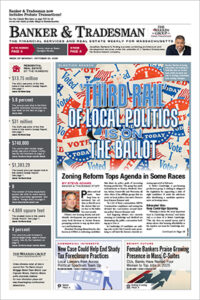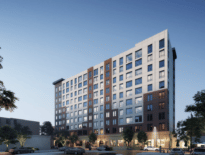
Unlike Boston’s late Mayor Tom Menino, who famously chose the crown on 111 Huntington Ave., incumbent Mayor Marty Walsh hasn’t exhibited the blatant cronyism of his predecessor.
I say this with all due respect, but frankly, I am a little confused here.
Is Michelle Wu running to be mayor of Boston, or to be the city’s planning and development czar?
Her likely foe, Boston Mayor Marty Walsh broke the news in an interview with the region’s daily newspaper last week that she told him she intends to challenge him for the city’s top job in 2021.
OK, Wu’s secret has been out for a long time, with the three-term at-large city councilor from Roslindale wearing her mayor ambition on her sleeve.
Yet the case Wu has spent years developing – no pun intended – appears better suited if she was interviewing to be the executive director of the Boston Planning & Development Agency, not chief executive of one of the nation’s oldest, greatest and most vibrant cities.
Boston prides itself as international hub for higher education, but its public schools have for decades been abysmal failures. Given this, Wu’s focus on arcane debates over development policy that have long been the province of a loud and cranky sliver of the electorate is perplexing.
Blow Up the BPDA? Really?
Last fall Wu released a 54-page critique calling for the demolition of the BPDA, which has overseen project approvals in the city for decades now.
The report hardly sparked a revolution on the streets of Boston.
Rather, it relitigated the wrong-headed policies of the old Boston Redevelopment Authority – the BPDA’s bureaucratic predecessor – which played a lead role in leveling the West End in the late 1950s in one of the more notorious examples of “urban renewal.”
While this is certainly important history, times have changed and today’s BPDA is hardly running around looking for neighborhoods to physically demolish.
Wu has since followed up her professorial assault on City Hall’s development arm with a battle over an even more arcane body, the Zoning Board of Appeal.
Little known outside the development world, the ZBA was catapulted into the headlines after a bribery scandal erupted last year. John Lynch, a former mid-level city official, was later sentenced to 40 months in prison for taking tens of thousands of dollars in bribes from a small developer in order to get a favorable vote from the board.
Wu, head of the City Council’s development committee, has tried to make hay with this issue, blocking Walsh’s nomination of new members to the understaffed board under the banner of reforming it.
But her move effectively gummed up the works at the ZBA, halting approvals of everything from home renovation projects to the construction of big new buildings, frustrating not just developers, but everyday residents as well.
But Wu’s response to the blowback over her decision to take the ZBA hostage could only warm the heart of a technocrat, calling it a fight over the “structure of the ZBA and its connection to … issues of inequity, of disparities that our development process has been exacerbating.”
Interesting, sure, but not exactly a call to the barricades.
We’ve Been Here Before
Now, it wouldn’t be fair to say Wu is a one–issue candidate, having pushed for a Green New Deal for Boston – another rather wonky issue – lobbied to make the MBTA fare-free.
However, if Wu hopes to become the first challenger to defeat a sitting mayor in 70 years, she had better come up with a new political playbook, and fast.
She appears to be borrowing more than a page or two from some of the failed mayoral challengers of the 2000s, like veteran city councilors Michael Flaherty, Maura Hennigan and motorcycle–riding businessman Kevin McCrea.
All three bet they could ride neighborhood resentment over luxury apartments and other new development all the way to the corner office on the fifth floor of City Hall.
And all three failed miserably to unseat the late, great Thomas M. Menino, leaving him to become the longest serving mayor in Boston history.
Certainly, the high-handed way Menino ran Boston’s development scene – even picking the crown for one Back Bay tower – stirred some level of resentment.
Under Menino, the BRA existed solely to implement the mayor’s marching orders and provide a useful political foil if a decision proved unpopular.
But even the blatant cronyism exhibited by Menino, whose developer “friends” were sure to land the most coveted building sites and deals in town, failed to rouse much if any grassroots anger beyond a thin layer of neighborhood activists and “good government” types.

Scott Van Voorhis
It’s doubtful such a strategy would work against Walsh.
While he has his faults, Walsh is no development dictator in the Menino mold, letting the since–renamed – and somewhat reformed – BPDA oversee and regulate new projects with some measure of independence.
Wu certainly has the talent and smarts to become a good mayor.
But sorry, playing the old bash-the-BPDA-card isn’t going to get her there.
Scott Van Voorhis is Banker & Tradesman’s columnist; opinions expressed are his own. He may be reached at sbvanvoorhis@hotmail.com.





